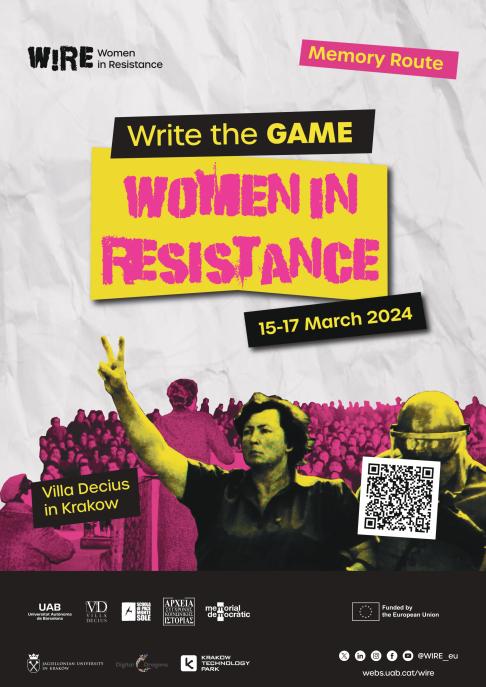History of Solidarity 13.03.2024
We invite you to a lecture on the history of Solidarity and a meeting with Liliana Batko-Sonik.

We invite you to participate in the lecture by Professor of the Jagiellonian University, Barbara Klich-Kluczewska on the history of Solidarity and a meeting with Liliana Batko-Sonik - an activist of the democratic opposition in the Polish People's Republic, which will be conducted by students of the Institute of History of the Jagiellonian University. The meeting will take place on March 15, 2024 at 6:30 p.m. at Villa Decjusz
The event is part of the WIRE project (Women in Resistance. Reshaping the Narratives on Female Antitotalitarian Resistance in Europe). The project concerns the role of women in broadly understood resistance movements against totalitarian regimes in Europe at various historical moments. WIRE participants work on preparing narrative game scenarios. As part of the project, students from the Faculty of History of the Jagiellonian University, involved on the Polish side, deal with the activities of women in "Solidarity".
Barbara Klich-Kluczewska – Polish historian, habilitated doctor in humanities, lecturer at the Jagiellonian University. Her research interests include the socio-cultural history of Poland in the 20th century and the history of women and gender, as well as autobiography and microhistory. She is co-editor of the monograph "Kobiety w Polsce 1945-1989. Nowoczesność - równouprawnienie - komunizm" (Published by Universitas, Kraków 2020)
Liliana Batko-Sonik – Polish philology (Jagiellonian University) alumna, anti-communist opposition activist, co-founder of SKS – Student Solidarity Committee (1972), and later also its spokeswoman. After the declaration of martial law on December 13, 1981, she was involved in helping the families of internees - including running an information point in her apartment. From 1984 to 1996, journalist of Radio France Internationale and Deutsche Welle. President of the Heritage Institute association, member of the Free Speech Association and the Social Committee for the Restoration of Monuments of the City of Krakow (SKOZK).
Participation in the event is possible after downloading the ticket available in our system:
https://bilety.willadecjusza.pl/index.php/repertoire.html?id=216
The WIRE project is financed by the EU under the CERV program.
The event is part of the WIRE project (Women in Resistance. Reshaping the Narratives on Female Antitotalitarian Resistance in Europe). The project concerns the role of women in broadly understood resistance movements against totalitarian regimes in Europe at various historical moments. WIRE participants work on preparing narrative game scenarios. As part of the project, students from the Faculty of History of the Jagiellonian University, involved on the Polish side, deal with the activities of women in "Solidarity".
Barbara Klich-Kluczewska – Polish historian, habilitated doctor in humanities, lecturer at the Jagiellonian University. Her research interests include the socio-cultural history of Poland in the 20th century and the history of women and gender, as well as autobiography and microhistory. She is co-editor of the monograph "Kobiety w Polsce 1945-1989. Nowoczesność - równouprawnienie - komunizm" (Published by Universitas, Kraków 2020)
Liliana Batko-Sonik – Polish philology (Jagiellonian University) alumna, anti-communist opposition activist, co-founder of SKS – Student Solidarity Committee (1972), and later also its spokeswoman. After the declaration of martial law on December 13, 1981, she was involved in helping the families of internees - including running an information point in her apartment. From 1984 to 1996, journalist of Radio France Internationale and Deutsche Welle. President of the Heritage Institute association, member of the Free Speech Association and the Social Committee for the Restoration of Monuments of the City of Krakow (SKOZK).
Participation in the event is possible after downloading the ticket available in our system:
https://bilety.willadecjusza.pl/index.php/repertoire.html?id=216
The WIRE project is financed by the EU under the CERV program.

